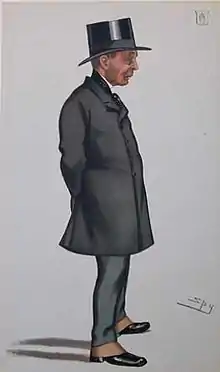Sir John Mowbray, 1st Baronet
Sir John Robert Mowbray, 1st Baronet PC (3 June 1815 – 22 April 1899), known as John Cornish until 1847, was a British Conservative politician and long-serving Member of Parliament, eventually serving as Father of the House.
Sir John Mowbray | |
|---|---|
%252C_by_Walter_William_Ouless.jpg.webp) John Robert Mowbray (Walter William Ouless, 1886) | |
| Father of the House of Commons | |
| In office 1898–1899 | |
| Preceded by | Charles Pelham Villiers |
| Succeeded by | William Wither Bramston Beach |
| Personal details | |
| Born | 3 June 1815 |
| Died | 22 April 1899 (aged 83) |
| Nationality | British |
| Occupation | Member of Parliament |
| Known for | Father of the House |
Biography
Mowbray was the son of Robert Stirling Cornish, and was educated at Westminster School and Christ Church, Oxford. In 1847 he married Elizabeth Mowbray, the sole heir of George Isaac Mowbray of Bishopwearmouth. The same year he assumed by Royal license the surname of Mowbray in lieu of his patronymic to reflect the large fortune he married into. Together, they had three sons and two daughters:[1]
- Annie Maud Mowbray (d.29 Oct 1926). She married Rev. Charles Thomas Cruttwell, Canon Residentiary of Peterborough.
- Edith Marian Mowbray (d. 27 March 1933); Unmarried.
- Sir Robert Gray Cornish Mowbray, 2nd Baronet (21 May 1850-23 Jul 1916)
- Sir Reginald Ambrose Mowbray, 3rd Baronet (5 Apr 1852-30 Dec 1916)
- Rev. Sir Edmund George Lionel Mowbray, 4th Baronet (26 Jun 1859-2 Feb 1919)

Mowbray as caricatured by Spy (Leslie Ward) in Vanity Fair, April 1882
In 1853 Mowbray was elected to the House of Commons for Durham, a seat he held until 1868, and then represented Oxford University from 1868 until his death in 1899. In the House, he was chair of the Committee of Selection and of the Standing Orders Committee.[2] He served as Judge Advocate General under the Earl of Derby from 1858 to 1859 and under Derby and later Benjamin Disraeli from 1866 to 1868. He was admitted to the Privy Council in 1858 and in 1880 he was created a baronet. From 1898 until his death the following year Mowbray was Father of the House of Commons.[1]
A bronze bust was erected as a memorial in the House of Commons in 1900.[2]
Notes
- Pollard 1901.
- "Political notes". The Times (36061). London. 9 February 1900. p. 10.
Sources
- A. F. Pollard; rev. H. C. G. Matthew (2004). "Mowbray , Sir John Robert, first baronet (1815–1899)". Oxford Dictionary of National Biography (online ed.). Oxford University Press. doi:10.1093/ref:odnb/19456.CS1 maint: multiple names: authors list (link) (Subscription or UK public library membership required.)
- Pollard, Albert Frederick (1901). . Dictionary of National Biography (1st supplement). London: Smith, Elder & Co.
External links
- Kidd, Charles, Williamson, David (editors). Debrett's Peerage and Baronetage (1990 edition). New York: St Martin's Press, 1990,
- Hansard 1803–2005: contributions in Parliament by Sir John Mowbray
- Leigh Rayment's list of baronets
- Leigh Rayment's Historical List of MPs
| Parliament of the United Kingdom | ||
|---|---|---|
| Preceded by Sir William Atherton Lord Adolphus Vane |
Member of Parliament for Durham City 1853–1868 With: Sir William Atherton 1853–1864 John Henderson 1864–1868 |
Succeeded by John Henderson John Robert Davison |
| Preceded by Sir William Heathcote Gathorne Hardy |
Member of Parliament for Oxford University 1868–1899 With: Gathorne Hardy 1868–1878 John Gilbert Talbot 1878–1899 |
Succeeded by Sir William Anson Lord Hugh Cecil |
| Preceded by Charles Pelham Villiers |
Father of the House of Commons 1898–1899 |
Succeeded by Bramston Beach |
| Political offices | ||
| Preceded by Charles Pelham Villiers |
Judge Advocate General 1858–1859 |
Succeeded by Thomas Emerson Headlam |
| Preceded by Thomas Emerson Headlam |
Judge Advocate General 1866–1868 |
Succeeded by Sir Colman O'Loghlen |
| Preceded by Charles Pelham Villiers |
Oldest Member of Parliament 1898–1899 |
Succeeded by Spencer Charrington? |
| Baronetage of the United Kingdom | ||
| New creation | Baronet (of Warennes Wood) 1880–1899 |
Succeeded by Robert Mowbray |
